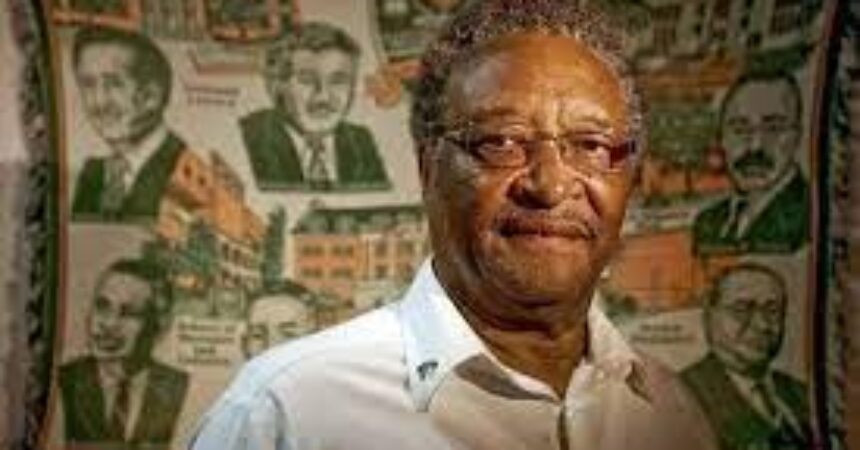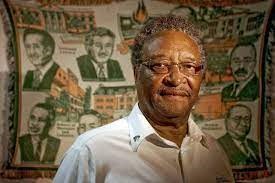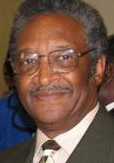
Former FAMU president Smith beat improbable odds on path to success


By St. Clair Murraine
Outlook Staff Writer
Walter L. Smith Sr. didn’t have the kind of childhood experiences that indicated he would become the transformational president that he was at Florida A&M University and later impact education across the country and in South Africa.
His early childhood and even adolescence years were filled with disruptive occurrences, while he endured life during segregation. Smith, who was president at FAMU from 1977 to 1985, died on Thanksgiving Day after being ill for seven months. He was 86.
“I was saddened to learn of the passing today of Florida A&M University’s seventh President and President Emeritus Walter L. Smith, Ph.D.,” said FAMU’s current president Larry Robinson. “Dr. Smith left an indelible mark as the university’s leader from 1977 – 1985, developing new academic programs and steering FAMU in the right direction.”
Smith’s story embodied what Blacks faced in the South. He was the son of sharecropper parents and went on to leave a lasting legacy at FAMU, where the School of Architecture and Engineering Technology building bears his name.
His death comes just five months after FAMU lost his predecessor Frederick Humphries.
“This is another great loss to Rattler nation,” said Rev. RB Holmes, a former member of the university’s board of trustees. “President Smith led FAMU in some of the most challenging times and he was a strong fortress in fighting for the future of FAMU.
“He won that battle against the forces to minimize the academic programs to limit student growth and the expansion of new buildings on campus. He was a builder, a visionary, a determined leader, a powerful personality, historian, publisher and one of the best presidents in the remarkable legacy of FAMU presidents.”
His son Walter L. Smith II recounted some of the stories about the hate and racism that his father experienced while growing up in Cairo, Ga. That was the city where one of his boyhood friends drowned while playing hooky, according to a 2010 interview that the older Smith did with Jennifer Diaz of the Tampa-Hillsborough County Public Library Systems’ Oral History Project.
In the interview, Smith talked about the time he spent in South Africa. His first trip was to the University of Malawi as a Fulbright Scholar. While there, he concentrated on higher-education. He made a second trip to Africa in 1993 and became the founding president of a two-year college.
His two youngest sons accompanied him while his daughter remained at home with their mother. His oldest son was serving in the military.
But even as their father achieved, they weren’t afforded a privileged lifestyle, the younger Smith said. He said their father never missed an opportunity to let them learn responsibility early.
They learned that life was “not a game,” the younger Smith said. “We were provided a very good quality of life. But there was nothing that said you would not have to work. We had to work.”
Smith’s rise from being a school drop out that earned a GED to becoming president of FAMU seemed like the script for Hollywood. But through all that Smith achieved, he made time to create teachable moments for his children.
For instance, his son recalled the day that his father dumped a truckload of dirt on the front yard and had him spread it out.
“He could have hired somebody,” the younger Smith said. “In order for me to do the things I wanted to do as a young man, I had to follow that direction.”
Smith was born in Tampa. Even that had a back story that is not well known outside of the family. However, his son shared that if it weren’t for his pregnant grandmother traveling from Georgia to find his grandfather, his dad might have been born on a tobacco plantation in Antioch, Ga.
As it turned out, Smith was born in a Tampa boarding house.
Before he was 10 years old, Smith couldn’t resist playing hooky, which led his mother to send him to Cairo to be raised by an aunt and her husband. While there he joined the 4H Club and the Boy Scouts. At the same time, he held down a job at a pickle plant.
Smith came face to face with racism when he was denied the Eagle Scout badge because of his race. Later, after taking two weeks away from his job at the pickle plant to attend a 4H state course, a co-worker who was temporarily given Smith’s job, refused to let him have his job back.
An exchange between Smith and his co-worker became heated after he was called the n-word. Smith used a metal slat from a pickle barrel to hit the co-worker.
He had to immediately leave Cairo because of the threat that he might face a lynch mob. He ended up in Tallahassee with relatives, according to his son’s account. However, within weeks he was on a Grey Hound bus to Harlem, N.Y. for his safety.
Smith ended up working in the garment district and again decided to put school on hold while he enlisted in the Army. After 32 months in the military at age 23, Smith told Diaz, he found himself attending Gibbs Junior College in Tampa.
By then, Smith and his wife Barbara were expecting their first child. Nothing could keep him from completing junior college, though.
“For two years I did that,” Smith said during the 2010 interview with Diaz. “Meantime, I worked hard. I waited tables; cut yards; and did everything else I could do that was legal to have enough money to stay in school.”
Not long after, Smith was back in Tallahassee with a $500 scholarship from his employer at a 7-11. He enrolled at FAMU, where he earned a Bachelor of Arts in biology and chemistry. Later he earned a Master of Education in administration and supervision from FAMU.
He took his education a step higher and earned a doctoral degree from FSU. His next career move took him to Roxbury Community College in Boston, Mass.
He was in the midst of straightening out the financial troubled junior college when FAMU called. He couldn’t refuse his alma mater and immediately began to make changes in the university’s academic and athletic programs.
He led a furious fight to prevent the merger of FAMU and FSU athletics. At the same time, he successfully took on the NCAA when it tried to downgrade FAMU’s classification in sports.
Smith told Diaz he was laughed at when he expressed his desire to take on the NCAA. He got the same reaction on other projects but when he was done, the Gaither Athletic Center was expanded, the track surfaced was rubberized. Improvements were also made in softball and baseball, but the biggest undertaking was renovation of Bragg Stadium, with the addition of a more functional field house.
During a five-year span, Smith put in motion plans for several changes at FAMU. In 1982 a new school of allied health was built simultaneously with the opening of a new school of journalism, media and graphic arts. A school of engineering was jointly opened with FSU and that same year, FAMU opened a school of general studies.
What Smith has accomplished at FAMU is evidence of his “confidence, savvy and vision,” said county Commissioner Bill Proctor. “The major infrastructure improvements under Dr. Smith’s tenure as FAMU’s president will remain self-evident long into the future.”







